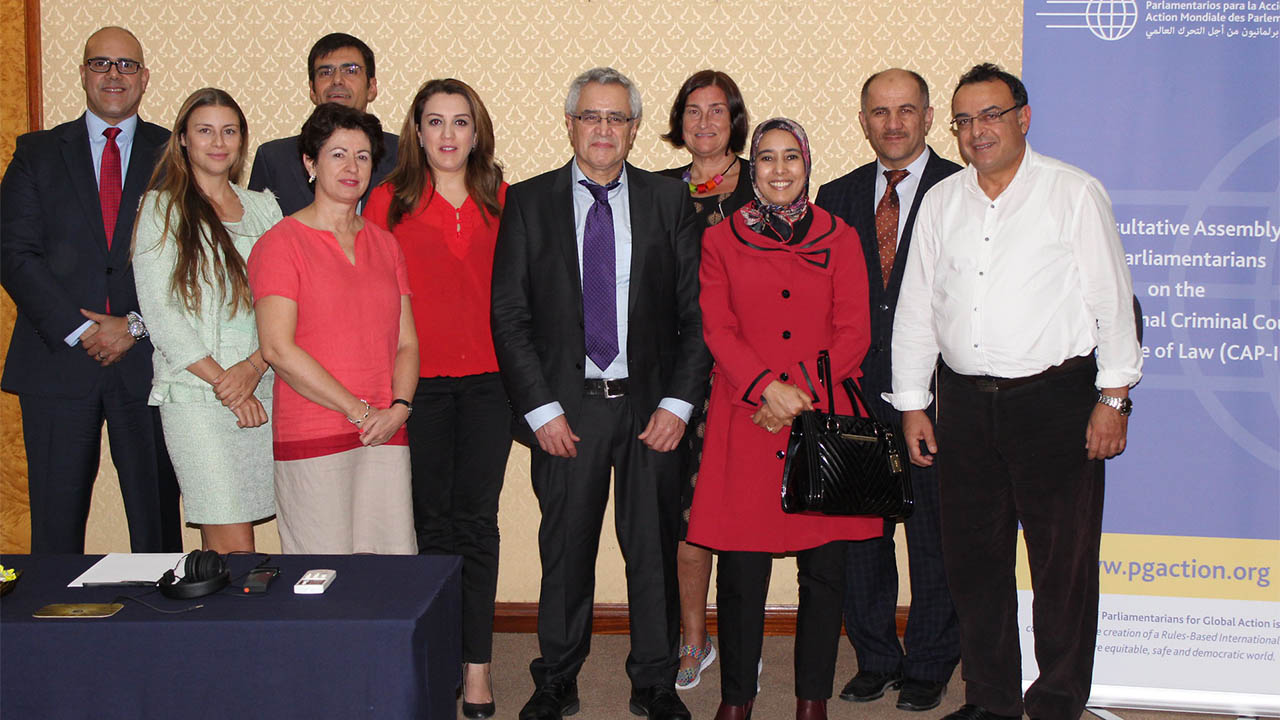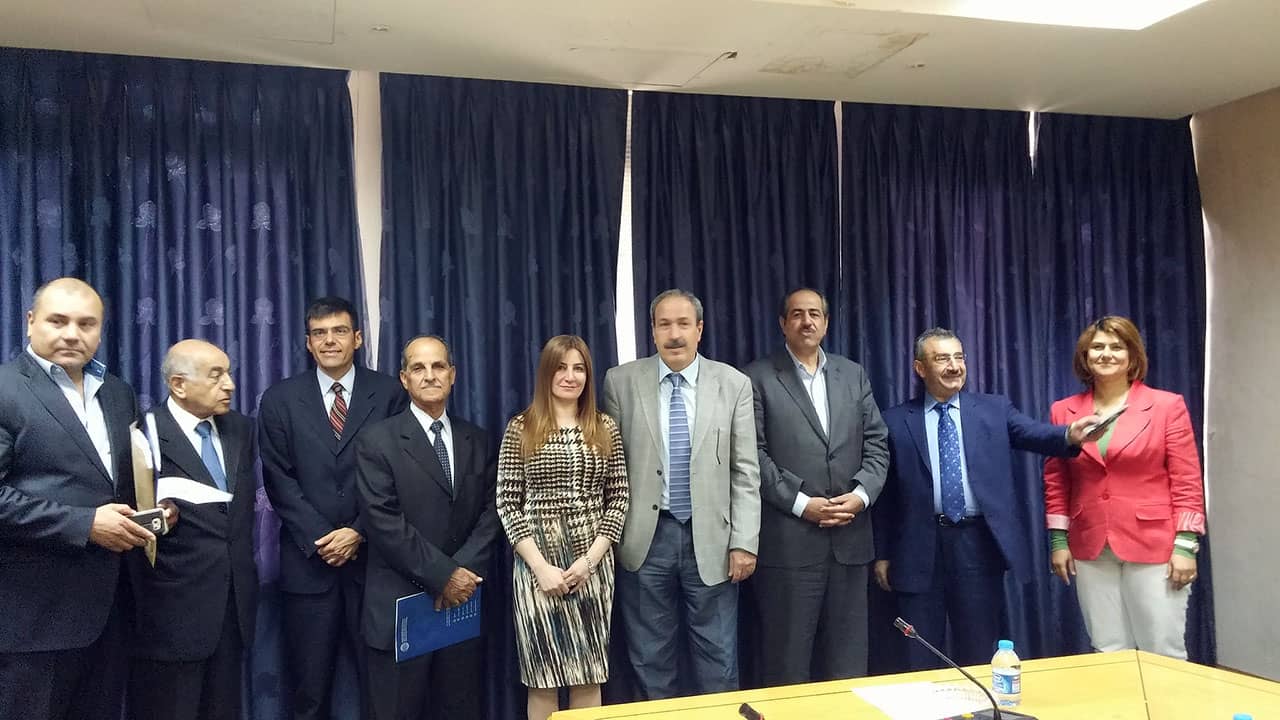PGA has worked with Parliamentarians from Lebanon since 2005 promoting the fight against impunity for the most serious crimes. Currently PGA is promoting accession to the Rome Statute and of the incorporation of the crimes under the Rome Statute into Lebanese legislation.
PGA and its members insist on the need to build political will and highlight the benefits to the civilian population of accession and in the adoption of domestic implementing legislation. While the Lebanese Republic faces numerous challenges to accession (including, among others, constitutional issues and the presence of armed movements on Lebanon’s territories), international criminal justice and the strengthening of international judicial mechanisms to fight against impunity takes special relevance in light of the spill-over effect from the Syrian conflict and the incursion of Syrian militias in the Lebanese territory.
PGA supports and stresses the need to achieve ratification also in light of the specific commitment to ratify the Rome Statute undertaken by Lebanon through the adoption the EU-Lebanon Action Plan in the framework of the new European Neighbourhood Policy (ENP) and the support for accountability and international judicial cooperation in the struggle against ISIS expressed by Lebanon within the International Organization of the ‘Francophonie’ (see http://www.dailystar.com.lb/News/Lebanon-News/2014/Nov-30/279377-lebanon-fm-appeals-for-international-help-to-fight-isis.ashx).
Following the repeated calls and commitments of PGA Members in Iraq and Lebanon to promote the ratification processes in those two countries, PGA will be organising a Parliamentary Seminar on the International Criminal Court (ICC): Towards the ratification of the Rome Statute of the ICC by Iraq and Lebanon, which will be hosted by Parliament of Lebanon, in Beirut on 27 and 28 July 2015. The Seminar will aim to enhance the role of Parliamentarians in the region to promote the universality of the ICC through the ratification/accession to the Rome Statute and to ensure the ICC system is implemented in a fair, impartial and effective manner. After a public Opening Session, the Seminar will foster political, legal and strategic consultations behind closed doors between Parliamentarians from Iraq, Jordan, Lebanon and Morocco, as well as with high-level representatives of the ICC, the United Nations, experts and observers from the Iraqi and Lebanese Government and the judiciary.
Rome Statute
Lebanon did not sign and has yet to accede to the Rome Statute.
Kampala Amendments of 2010
Lebanon has not ratified the Kampala Amendments
Status on the domestic implementation of the Rome Statute
Lebanon has not enacted implementing legislation of the Rome Statute.
Agreement on Privileges and Immunities of the Court (APIC)
Lebanon has not signed the Agreement on Privileges and Immunities.
Progress and PGA Action
In December 2014, PGA’s most active member in the parliament of Lebanon, Dr. Ghassan Moukheiber participated in the 8th Consultative Assembly of Parliamentarians for the International Criminal Court and the Rule of Law (CAP ICC) and expressed again his continued support for the ICC and the need for his country to accede to the Rome Statute. He publicly stated that the ICC should "prosecute those responsible for war crimes and crimes against humanity in the Middle East, especially those who commit these crimes on the Lebanese land”. In this context and in the framework of the CAP-ICC, PGA organized a meeting between Dr. Ghassan Moukheiber and Judge Sang-Hyun Song, the President of the ICC, where they were able to discuss the best way to move forward for Lebanon to join the ICC.
In respect of alleged mass-atrocities perpetrated by ISIS/ISIL, it is worth noting that the ICC Prosecutor has already jurisdiction over alleged crimes against humanity committed by Tunisian and other foreign-fighters with nationality of a State Party to the Rome Statute, regardless of the territory in which such atrocities are committed (Syria, Iraq or Northern Lebanon). However, fully-fledged investigations over persons bearing the greatest responsibility for these atrocities could be better undertaken if Lebanon and other States in which ISIS operates would accede to the Rome Statute and, as appropriate, accept the ICC jurisdiction for the situation in question.
It is the firm belief of PGA that, should Lebanon ratify and accept the jurisdiction of the ICC under Art. 12(3) of the Rome Statute, then the Court's OTP and the Judges would be almost compelled to take action on atrocities committed by ISIS and its allies in Northern Lebanon.
At the PGA Working Group Meeting in The Hague in June 2007, Dr. Ghassan Moukheiber, MP, presented the very difficult situation in Lebanon with the establishment of the Special Tribunal for Lebanon, the split of the former national unity Government and the outcome of the 2006 conflict, the outcome of which de facto weakened a momentum towards ICC accession that PGA had contributed to create in the first semester of 2006. Despite this scenario, Dr. Moukheiber requested the help of PGA to develop a three-prong plan concerning the ICC, which included reporting to parliament and facilitating communication and creating political will to achieve:
(a) the accession of Lebanon to the Rome Statute;
(b) the acceptance of the ad hoc jurisdiction of ICC through article 12.3 of the Rome Statute for the crimes committed in Lebanese territory during the conflict of the summer of 2006; and
(c) the incorporation of the Rome Statute in the domestic order.
The strong arguments used by Dr. Moukheiber to support this strategy include, inter alia, the deterrence potential of Rome Statute system, in order to prevent the future commission of war crimes, crimes against humanity or genocide in the Lebanese territory. The Parliamentarian had the possibility to highlight his strategy and present it to the Government in a number of public and private occasions, including at the first Arab League-ICC co-organized conference, which was held in Doha, Qatar, in May 2011.
On 19 - 22 May 2006, in Beirut, Lebanon, PGA and Justice Sans Frontieres organized a Round-Table Discussion on the ICC and the relationships to the countries Lebanon, Bahrain, Jordan and Morocco. Law-makers from Lebanon outlined the numerous obstacles to the national process of accession, including constitutional issues and the presence of armed movements on Lebanon’s territories. One critical issue at that time for Lebanon was that the crime of aggression, had not yet been defined. Dr. Ghassan Moukheiber, MP stated that technical problems could be solved, but “political will must be built”. PGA Member Mr. Boutros Harb, MP (Former Minister of Justice of Lebanon) presented a comprehensive overview on the Lebanese and regional situation, and concluded that joining the ICC would be beneficial to the civilian population.
Since early 2006, PGA Members stressed that the Government of Lebanon should build upon the courageous political initiatives that had been undertaken by the late Mr. Gebran Tueni, MP, assassinated on 12 December 2005 in the framework of the systematic attacks carried out against prominent personalities in Lebanon. Mr. Tueni was preparing a Bill on Lebanon’s Accession to the ICC Statute: On 7 December 2005, he released this courageous statement: “Lebanon has suffered the worst crimes against humanity whose repercussions are still with us and joining the ICC would grant the Lebanese people with true guarantees and effective tools to allow the truth to emerge about all that they have suffered and continue to suffer.” PGA honors the legacy and leadership of Mr. Tueni by relentlessly continuing to promote Lebanon’s accession to the Rome Statute.
Human Rights Council Universal Periodic Review
Lebanon did not receive any recommendations regarding the Rome Statute in its last UPR, held in November 2010. Lebanon will be reviewed at the 23rd session of the second cycle on November 2015.










